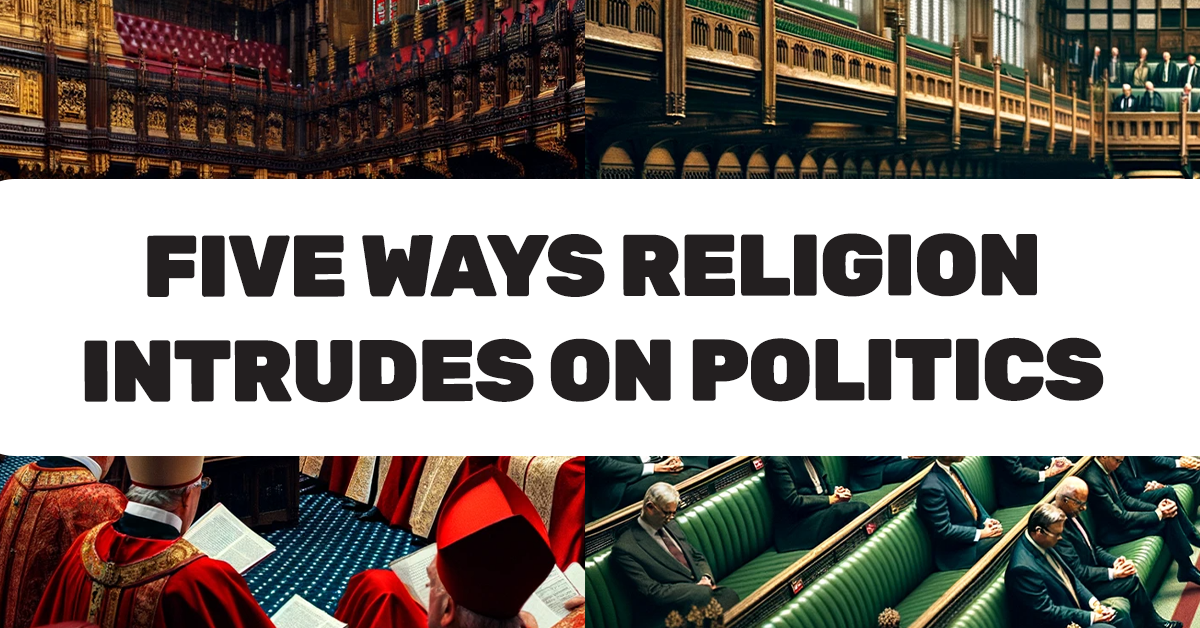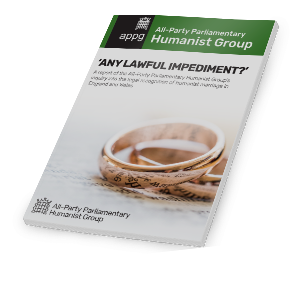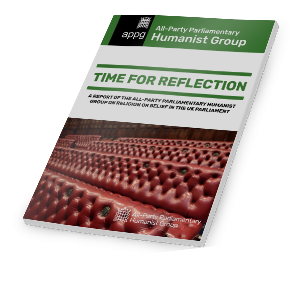
From the presence of bishops who vote against equality laws in the House of Lords, through to the ‘prayer advantage’ in the House of Commons, medieval anachronisms continue to shape the course of politics in modern Britain – one of the least religious societies on Earth. Here are five key examples we want everyone to be aware of, so we can work towards a more democratic, inclusive, and modern society.
1) Bishops in the House of Lords
The UK is alone among democratic sovereign states in having clerics vote on our laws by right – a hangover from 14th century medieval England. And it simply doesn’t reflect the country we are today. Whether it’s been on assisted dying, same-sex marriage, or abortion reform – Church of England bishops have wielded real political power. We think it’s time for reform. And recent developments in the Isle of Man should reignite this conversation ahead of a general election.
2) ‘Prayer advantage’ in the House of Commons
For centuries now, each day in the Commons and the Lords has begun with Anglican prayers. Today is no different. But because MPs still reserve their seats using a ‘prayer card,’ during the most important debates only backbench MPs who join for prayer get the chance to fully take part in the debate. It is sad but true. But, with our help, the All-Party Parliamentary Humanist Group is working towards a fairer, more inclusive way of conducting parliamentary business.
3) Powerful support for faith schools and collective worship
The public in surveys overwhelming back reform of religion in schools – but both government and opposition politicians are afraid to upset religious stakeholders. This results in an incredibly non-religious UK having ever more faith schools, with more segregation, division, and discrimination. Continuation of this practice flies in the face of recent damning evidence from many of the UK’s leading education experts. We think it’s time there was an honest and informed conversation about faith schools.
4) Impact on assisted dying laws
There is no issue in public life that the public backs more strongly than assisted dying. The campaign has higher public approval ratings than the monarchy or English football. This is also true among disabled people. Yet politicians treat the issue as controversial. Religious opponents to assisted dying talk about the ‘sanctity of life‘. But these religious views shouldn’t be imposed on terminally ill or incurably suffering people who want an assisted, dignified death at a time and place of their own choosing. It’s our hope that before long, the UK will adopt a more compassionate law based on dignity – which upwards of 90% of the population wants.
5) Impact on abortion rights and Safe Access Zones
Fundamentalist opposition to abortion is well known – we’re seeing it more and more on the streets – but these religious views are manifesting themselves in Parliament in very real ways. At the end of last year, we saw three Private Members Bills in the House of Lords that aimed to restrict women’s ability to have legal abortions in the United Kingdom. Fast forward to 2024, and the UK Government proposed draft guidance for abortion Safe Access Zones that panders to religious fundamentalists, and would, in fact, overturn the will of Parliament on the issue.
Notes
For further comment or information, media should contact Humanists UK Director of Public Affairs and Policy Kathy Riddick at press@humanists.uk.
Read more about our work on bishops in the House of Lords.
Humanists UK is the national charity working on behalf of non-religious people. Powered by 120,000 members and supporters, we advance free thinking and promote humanism to create a tolerant society where rational thinking and kindness prevail. We provide ceremonies, pastoral care, education, and support services benefitting over a million people every year and our campaigns advance humanist thinking on ethical issues, human rights, and equal treatment for all.
Reports of the All-Party Parliamentary Humanist Group
Humanists UK is secretariat to the All-Party Parliamentary Humanist Group (APPHG), a group of MPs and peers who meet to discuss humanist issues and support many of the same causes we do. We provide administrative support and policy expertise to the group’s own research work. Some of the APPHG’s published reports are collected below.

Any Lawful Impediment?
The All-Party Parliamentary Humanist Group published this report on its inquiry into delays legalising humanist marriage in England and Wales.

Time for Reflection
The All-Party Parliamentary Humanist Group examined the treatment of religion or belief in the UK Parliament, including practices like appointing bishops to the House of Lords and use of ‘prayer cards’.
